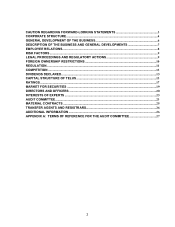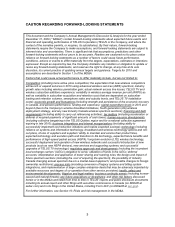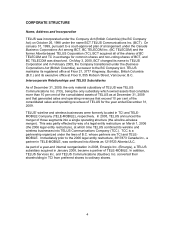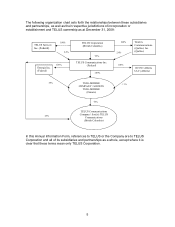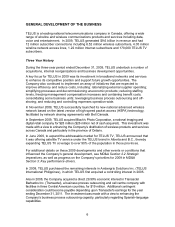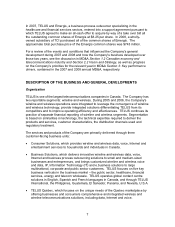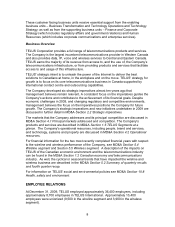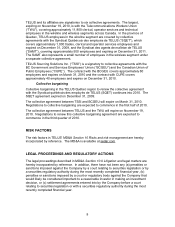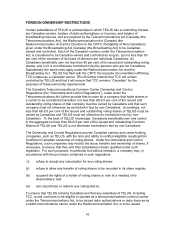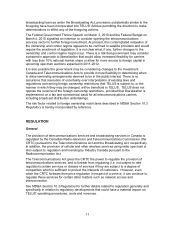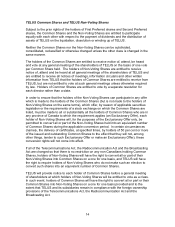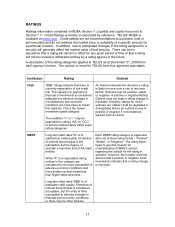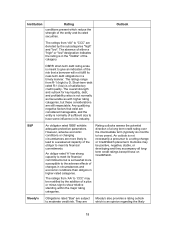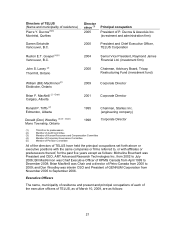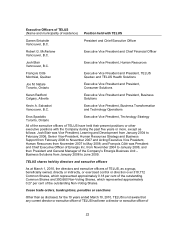Telus 2009 Annual Report Download - page 12
Download and view the complete annual report
Please find page 12 of the 2009 Telus annual report below. You can navigate through the pages in the report by either clicking on the pages listed below, or by using the keyword search tool below to find specific information within the annual report.Regulation of wireless services
The use of radio spectrum is subject to regulation and licensing by Industry Canada
pursuant to the Radiocommunication Act, which is administered by Industry Canada. All
of TELUS’ wireless communications services depend on the use of radio frequencies.
While economic regulation of wireless services falls under CRTC jurisdiction, wireless
services have, generally, been subject to regulatory forbearance.
The Minister of Industry has the authority to suspend or revoke radio spectrum licences
if the licence holder has contravened the Radiocommunication Act, regulations or terms
and conditions of its licence and after giving the holder of the licence a reasonable
opportunity to make representations. Licence revocation is rare; licences are usually
renewed upon expiration. See MD&A Section 10.3 Regulatory for further details related
to regulation generally and specifically in relation to radiocommunication licences
regulated by Industry Canada.
Radiocommunications spectrum licences
TELUS holds radiocommunication spectrum licences and authorizations for a variety of
wireless services and applications, both mobile and fixed. TELUS holds significant 1.9
GHz PCS spectrum throughout Canada, is the leading holder of 800 MHz SMR/ESMR
spectrum in all of the major Canadian markets, and holds 25 MHz of cellular 800 MHz
spectrum in Alberta, B.C. and eastern Québec. TELUS also was successful in obtaining
AWS spectrum licences for an average of approximately 16 MHz covering a national
footprint in the Industry Canada spectrum auction in 2008. In addition, TELUS holds
various radio spectrum licences for fixed services in the 24/38 GHz, 2.3/3.5 GHz band
throughout Canada, paging services, and other miscellaneous wireless services. See
MD&A Section 10.3 Regulatory for further details related to regulation generally and
specifically in relation to future availability and cost of wireless spectrum and
radiocommunication licences regulated by Industry Canada.
Broadcasting services
The Broadcasting Act governs all types of broadcasting activities including commercial
off-air radio and television broadcasting, the operation of other programming services
such as specialty and pay television, as well as the distribution of television services
through cable or satellite undertakings.
The Broadcasting Act and its regulations give the CRTC the authority to issue licences
for specific categories of broadcasting undertakings and to regulate the content provided
and rates charged by each category of broadcasting undertaking. In August 1996, the
federal government issued its policy under which “telecommunications common carriers”
(as defined in the Telecommunications Act) would be allowed to apply for broadcasting
distribution undertaking (BDU) licences to provide cable television service. In 1997, the
CRTC confirmed that new entrant BDUs, including telecommunications common
carriers, would not be rate regulated and would not have an obligation to serve.
However, the CRTC confirmed that new entrants would have to meet all the same
content and carriage obligations as incumbent BDUs.
TELUS has been licensed by the CRTC to operate Class 1 Regional BDUs in each of
B.C., Alberta and Québec utilizing its IP facilities. TELUS also holds a national licence
12


